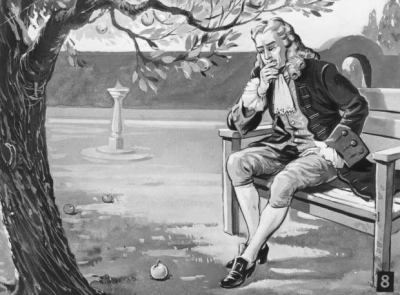
With the outbreak of the bubonic plague, Cambridge University closed its doors in 1665. As a result, Newton was forced to return home to Woolsthorpe Manor where he ended up staying with his mother for over a year. In the peaceful countryside, he concentrated on the scientific problems about which he had wondered during his post graduate years.
Some of his greatest discoveries such as the laws of gravity, laws of motion, and the components of white light had their origin during this time.
It is said that Newton was sitting in the orchard when he saw an apple falling from a tree. Contrary to popular versions of this event, there is no evidence to suggest that the apple had fallen on his head. Pondering upon what he saw, Newton wondered why apples fall straight to the ground rather than going upwards or sideways. Following this line of thought, he finally formulated the law of universal gravitation.
This was the account of his discovery given by Newton himself to his acquaintances including the French philosopher Voltaire; his assistant at the Royal Mint, John Conduitt who was the husband of his niece Catherine Barton; his friend William Stewkeley; and Christopher Dawson who was a student at Cambridge. The note on Newton’s life collected by John Conduitt in 1726 contains the first written account.
The year he spent in Woolsthorpe later came to be called his annus mirabilis (year of wonders). Newton returned to Cambridge in 1667.
Picture Credit : Google

